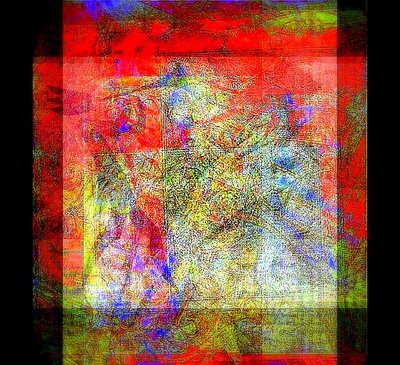 [digital composite: billy bragg, british suffragettes, blake book, blake drawing, blake portrait, text of “jerusalem,” & proms logo, 2006]
[digital composite: billy bragg, british suffragettes, blake book, blake drawing, blake portrait, text of “jerusalem,” & proms logo, 2006]“jerusalem,” the song synthesizing william blake’s piercing lines with hubert parry’s scorching tune, has different meanings depending upon whom you ask. those who fought for women’s suffrage saw it as a call to arms… rugby fans and the “patriotic” set hear it as love of god and country. (king george v favored it over “god save the king” as the national anthem.) oh, and the labour party had their go at it too—it was used by the triumphant clement attlee campaign that wrested away power from winston churchill. (mr. attlee’s government may have done wonderful things like creating the national health service, but he also made that disgraceful, detestable, and insufferable anti-semite ernest bevin british foreign secretary.) today, it concludes the bbc proms summer concert program—along with edward elgar’s “pomp and circumstance march no. 1” (land of hope and glory), sir henry wood’s “fantasia on british sea songs,” and thomas arne’s “rule britannia.”
“jerusalem” brings back a blustery (yet sunny) sunday morning in buenos aires when i was lost only blocks away from the casa rosada: its strains the beacon guiding me to services at that city’s anglican cathedral in july 2001. from where else, but an anglican service, would that music be coming! to my amusement, i discovered they were singing “jerusalem” in castellano.
personally, i see “jerusalem” as a revolutionary anthem recalling the horrendous human wreckage and dislocation of the industrial revolution, accompanied as it was by environmental destruction—especially relevant in today’s globalization trauma, closing auto plants, and slave labor job encroachment upon employment with benefits and human dignity. (kinda makes me jealous of brits, who get so many more opportunities to sing it.)
And did those feet in ancient time
Walk upon England's mountains green?
And was the holy Lamb of God
On England's pleasant pastures seen?
And did the Countenance Divine
Shine forth upon our clouded hills?
And was Jerusalem builded here
Among these dark Satanic mills?
Bring me my bow of burning gold:
Bring me my arrows of desire:
Bring me my spear: O clouds unfold!
Bring me my chariot of fire.
I will not cease from mental fight,
Nor shall my sword sleep in my hand
Till we have built Jerusalem
In England's green and pleasant land.
billy bragg said it best in the liner notes of his 1990 cd “the internationale”:
“my belief that jerusalem is a left-wing anthem has got me into arguments with public schoolboys at eton and trotskyist newspaper sellers in trafalgar square. nevertheless, i remain convinced that this song does not belong alongside 'rule brittania' and 'land of hope and glory' at the last night of the proms. william blake was a radical and a visionary. a friend of thomas paine, [blake] was harassed by the establishment of his day, eventually being arrested for sedition. written at the time of the industrial revolution, i believe this song is an attack on the new breed of capitalists that blake saw in his midst. it asks how the morals of christ could possibly be compatible with the morality of exploitation of people and the environment.”
as an american, bragg’s comments are especially relevant in terms of blake’s relationship with thomas paine—the most revolutionary of our founding fathers and the true moral inspiration of the american revolution. paine is the radical whose incendiary writings and ideas may well be the most enduring mortar of our revolution. i remember having to memorize paine’s “american crisis” as a ninth grader: something done with little enthusiasm. reading paine’s words today, i realize that learning experience was wrecked by watergate then raging—on the heels of our vietnam experience and the coup in chile:
“these are the times that try men's souls. the summer soldier and the sunshine patriot will, in this crisis, shrink from the service of their country; but he that stands it now, deserves the love and thanks of man and woman. tyranny, like hell, is not easily conquered; yet we have this consolation with us, that the harder the conflict, the more glorious the triumph. what we obtain too cheap, we esteem too lightly: it is dearness only that gives every thing its value. heaven knows how to put a proper price upon its goods; and it would be strange indeed if so celestial an article as freedom should not be highly rated.”
one can only hope that paine will eventually have his parry… but then, do we really want to hear paine’s words sung by the super bowl's insipid?
No comments:
Post a Comment